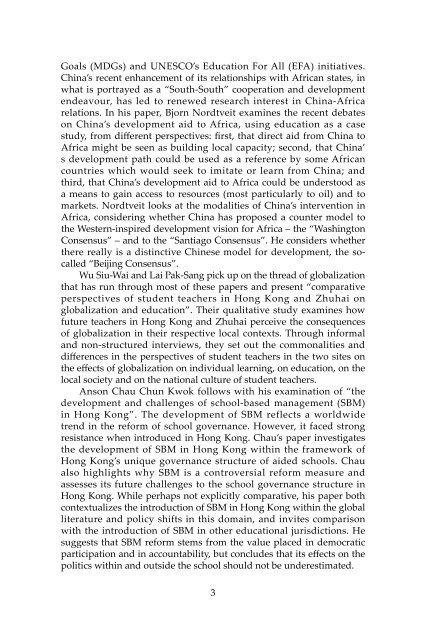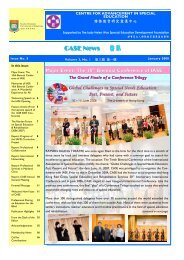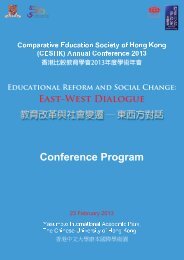Comparative Education Bulletin - Faculty of Education - The ...
Comparative Education Bulletin - Faculty of Education - The ...
Comparative Education Bulletin - Faculty of Education - The ...
Create successful ePaper yourself
Turn your PDF publications into a flip-book with our unique Google optimized e-Paper software.
Goals (MDGs) and UNESCO’s <strong>Education</strong> For All (EFA) initiatives.<br />
China’s recent enhancement <strong>of</strong> its relationships with African states, in<br />
what is portrayed as a “South-South” cooperation and development<br />
endeavour, has led to renewed research interest in China-Africa<br />
relations. In his paper, Bjorn Nordtveit examines the recent debates<br />
on China’s development aid to Africa, using education as a case<br />
study, from different perspectives: first, that direct aid from China to<br />
Africa might be seen as building local capacity; second, that China’<br />
s development path could be used as a reference by some African<br />
countries which would seek to imitate or learn from China; and<br />
third, that China’s development aid to Africa could be understood as<br />
a means to gain access to resources (most particularly to oil) and to<br />
markets. Nordtveit looks at the modalities <strong>of</strong> China’s intervention in<br />
Africa, considering whether China has proposed a counter model to<br />
the Western-inspired development vision for Africa – the “Washington<br />
Consensus” – and to the “Santiago Consensus”. He considers whether<br />
there really is a distinctive Chinese model for development, the socalled<br />
“Beijing Consensus”.<br />
Wu Siu-Wai and Lai Pak-Sang pick up on the thread <strong>of</strong> globalization<br />
that has run through most <strong>of</strong> these papers and present “comparative<br />
perspectives <strong>of</strong> student teachers in Hong Kong and Zhuhai on<br />
globalization and education”. <strong>The</strong>ir qualitative study examines how<br />
future teachers in Hong Kong and Zhuhai perceive the consequences<br />
<strong>of</strong> globalization in their respective local contexts. Through informal<br />
and non-structured interviews, they set out the commonalities and<br />
differences in the perspectives <strong>of</strong> student teachers in the two sites on<br />
the effects <strong>of</strong> globalization on individual learning, on education, on the<br />
local society and on the national culture <strong>of</strong> student teachers.<br />
Anson Chau Chun Kwok follows with his examination <strong>of</strong> “the<br />
development and challenges <strong>of</strong> school-based management (SBM)<br />
in Hong Kong”. <strong>The</strong> development <strong>of</strong> SBM reflects a worldwide<br />
trend in the reform <strong>of</strong> school governance. However, it faced strong<br />
resistance when introduced in Hong Kong. Chau’s paper investigates<br />
the development <strong>of</strong> SBM in Hong Kong within the framework <strong>of</strong><br />
Hong Kong’s unique governance structure <strong>of</strong> aided schools. Chau<br />
also highlights why SBM is a controversial reform measure and<br />
assesses its future challenges to the school governance structure in<br />
Hong Kong. While perhaps not explicitly comparative, his paper both<br />
contextualizes the introduction <strong>of</strong> SBM in Hong Kong within the global<br />
literature and policy shifts in this domain, and invites comparison<br />
with the introduction <strong>of</strong> SBM in other educational jurisdictions. He<br />
suggests that SBM reform stems from the value placed in democratic<br />
participation and in accountability, but concludes that its effects on the<br />
politics within and outside the school should not be underestimated.<br />
3
















